There's a post I've needed to write all week. It starts like this,"Goodbye, dear Fran."
Fran died on Tuesday morning breaking my heart.
I first met Fran in 2007. I was her pastor. I started visiting her at the senior pastor's request as part of my associate pastor job. But before I knew it, I was at her house more than was asked of me. I was in a season of life that didn't really fit me. But with Fran I always seemed to fit in just fine.
She was a 83-year-old shut-in. Well, sort of. While it was true, Fran lived in her home alone, but she never wanted you to say she was "shut in." Fran got out!
She drove her own car with pride (though honestly I held my breath when I rode with her). She came to church every week, Sunday School and worship alike. She got her hair done at JCPenney's. And, she bought her own groceries. She was always up for a meal out if it involved a person she liked and Chinese, Ledo's pizza or Italian.
I kept going back to see her during that two-year tenure in her town because there was something about my conversations with Fran that always left me better.
This was the magic: Fran saw me.
When we first met, Fran saw my gifts for preaching (and especially loved that she could hear me when I spoke without having to turn up her hearing aids).
Fran saw that I was lonely living out on my own for the first time in Gaithersburg, MD when all my friends and husband-to-be lived in DC.
Fran saw that I worried about being true to myself and living out my calling. There were many days when it all felt too confusing. "You'll get there, Elizabeth. You will."
And when Fran came to my church office the day I told her that I was leaving (another congregation called me to be their solo pastor across town), we both wept. We wept and wept and wept. But she knew I needed to go. "You are meant to be in the pulpit every week," she reminded me over and over again. "But don't forget me."
I promised her I wouldn't as she and several other members of the church treated me to a goodbye lunch.
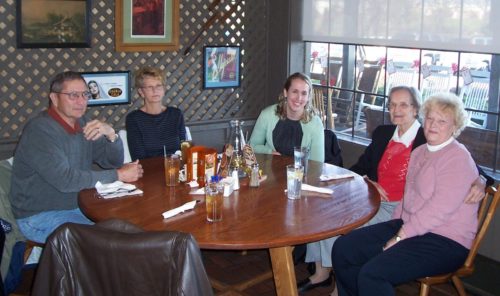
And I didn't. Over the next several months, we crossed the bridge together of becoming friends.
And this was the magic: I saw Fran.
I saw that Fran was a member of a church that didn't always get her either. (Never lacking of opinions, Fran wasn't afraid to say a project or budget item was foolish. Got to love a truth-telling woman!).
I saw that Fran was a person that enjoyed a rich conversation, even though she lived alone. People don't have these very often in our fast paced everything, she often told me.
I saw Fran as a person with much to offer the world-- if even just in talking to me for the afternoon-- at age 84, 86 and 88. As I left her house, she watched me pull out of the driveway as she waved mouthing: "I love you."
I loved her too.
The cherry on top was the fact that she and my husband shared a birthday. So even as life took me to places like Oklahoma (which she wasn't happy about), Kenya, Honduras and beyond, we always kept up on the phone and through visits when I was back in the area.
Kevin and Fran and I even shared a birthday lunch together over pizza. It was her 90th.
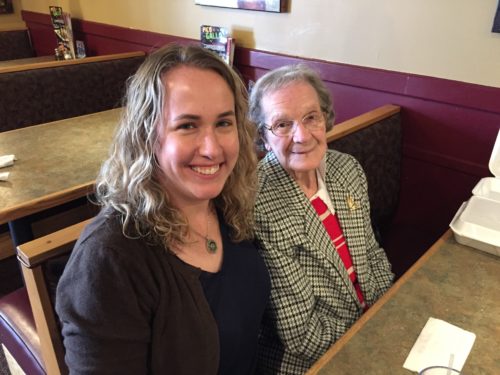
There's a book I finished only minutes before I heard she was reaching the final end of her life called Adopted: the sacrament of belonging in a fractured world by Kelley Nikondeha.
In the final chapter, Nikondeha writes this, "God's family stretches beyond our smaller notions of biological or ethnic connection. . . . It's the continual work of the prophets and the Spirit to open our eyes to this simple yet astounding truth: Anyone can be our family if we let them."
Fran was my family. I'm glad God made it so.
She celebrated with me the purchase of my home wanting to see pictures of every room.
She cheered on the publication of my book Birthed and read every word telling me: "You've got wise things to say to people, Elizabeth, even us old people. We need to learn from you."
And with much joy she welcomed my daughter into her loving embrace as well. Giving my girl the short, but powerful gift of having a "great-grandmother" something I couldn't have offered her without Fran. For Christmas last year she wrote my daughter a $15 check with a card. 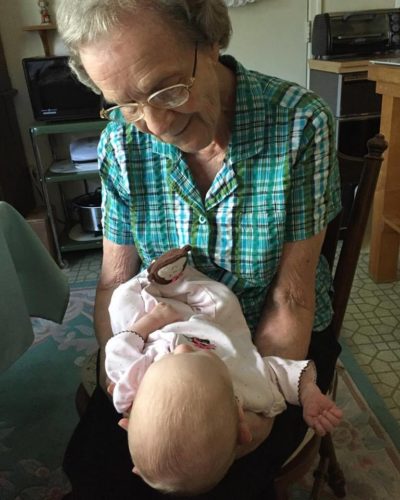
One day, I'll tell my daughter about these memories of Fran.
I'll tell her that when she meets people who truly see her, like Fran did me, she'll need to stay close. I'll tell my daughter the most beautiful parts of life emerge when we plant both feet of ours in the space of love.
Sure, it will hurt like hell when they leave us. But, our hearts will have been forever molded into something so real. Our souls will be filled with such belonging because of love's pure joy.
Fran wasn't afraid of death in the end. When I visited her a month before she died, "Now, don't be afraid to pray for me to die. I'm ready." (I would pray no such prayer though!)
This I know for sure: Fran's story will forever be a part of mine. Her life, her living room, her telephone opened up space for me to be me.
Goodbye, dear Fran. You will be missed more than you know. And I hope I don't cry too much when I lead your funeral. You deserve the best because you were the best.
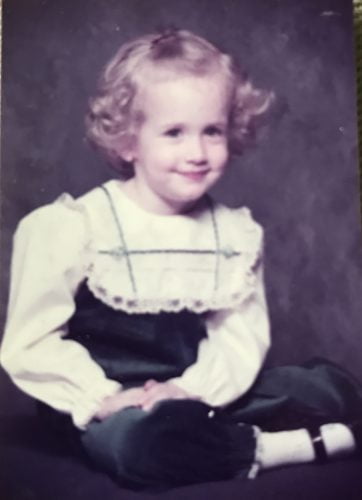 I am a cradle Christian.
I am a cradle Christian.
My name was on the Sunday School roll in the church nursery before I was born.
The stories of scriptures and words of the Bible have always been readily accessible to me when I was just a toddler (as seen in this picture).
I could recite the books of the Bible by the time I was 7 and could name the fruits of the spirit from the book of Galatians by age 9. The Christian school my parents sent me to in junior high challenged me to read the Bible through in the 7th grade (and I did!). I had a working knowledge of church history high school. I really don't know another way, for good or the bad.
But, the older I get, I realize, my story is an anomaly.
We don't teach our kids Bible stories, Bible facts or even stories of faith like I was taught in the height of Southern Baptist evangelicalism of the 1990s. As stiff structure surrounding the institutional church dies, fewer and fewer kids are growing up as I did including my own daughter.
Instead, the folks that fill the church pews of the congregations I'm most drawn to pastor aren't people who would call themselves cradle Christians. Or if they do, they'd say they are "recovering from it." I also hear a lot of "I'm a Christian but not that kind . . . "
Maybe cradle Christians are a dying bred?
If this is true, then how then do people arrive at faith, then, if not by osmosis from childhood? Isn't that how most people chose a religious tradition?
Recently, while I attended Wild Goose Festival in Hot Spring, NC I had the opportunity to meet a fellow author with a story that answers such a question. Kate Rademacher is a recent convert to Christianity is the author of a new memoir called, Following the Red Bird: First Steps into a Life of Faith.
In her book, she describes how after years of living in a social conscious, yet secular home and marrying a practicing Buddhist husband, she finds herself hearing the voice of God for the first time.
Though her childhood idea of the Trinity was "reduce, reuse and recycle" she found herself saying "Hello" (literally just like that) to God. The conversation took off from there (how amazing!). Within months, Kate found herself on a Christian path learning more about Jesus then seeking baptism in the Episcopal Church several years later.
Kate's prose was refreshingly honest and engaging. You never feel like Kate is telling you what you want to hear but what actually is her experience of God. Once I started reading Following the Red bird, I couldn't put it down. I finished it the next day.
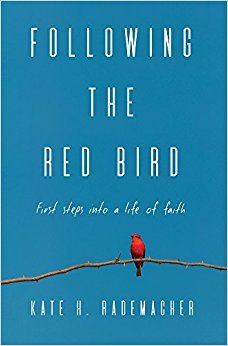 When I got to the last page, I felt grateful for the way that Kate calls out cradle Christians like me for our privilege (even if that was not the main focus of her story).
When I got to the last page, I felt grateful for the way that Kate calls out cradle Christians like me for our privilege (even if that was not the main focus of her story).
Seeing the world through Kate's lens, we, cradle Christians, have no idea how scary it is to walk into a study group with no working knowledge on the Bible.
We have no idea what it feels like to be drawn to a life of prayer without what to say.
We have no idea how discernment feels like without any spiritual tools to know if you're a helpful track or not.
So, as a pastor, I'm so thankful to have Kate's story as a resource for spiritual seekers who find their way to my inbox or office.
But even more than this, I'm grateful for how Following the Red Bird opened up my spiritual imagination.
We, as cradle Christians or even as professional ministers, can get so stressed out on God's behalf (or so we say).
We invest in lives, hoping for spiritual growth, but nothing changes. We preach our hearts out and it feels like no one is listening. We expect a particular trajectory for the spiritual formation of our children or grandchildren. And we feel sad when it doesn't happen.
I even saw that with the baptism of my daughter several months ago. Several well wishers remarked on social media that they wish she grows up to be a "God-fearing woman who takes to the teachings of the faith early." While I know it came from a loving place, my first reaction was "What pressure! Don't put that on her."
Here's the thing I believe about spiritual journeys (which Kate's story helped to me to see all over again): we can't control them.
The best conditions for spiritual instruction can't make a person find a personal conviction. Nor can lack of religious education keep a person from God when it's the right time for the journey to begin.
Openness is really the best gift we can give each other, especially to our children.
Isn't that what faith is about in the first place? Letting go and trusting in a power beyond what we can see?
I'm glad, as a cradle Christian, for the gift that Kate's faith story is to the world.
(Check out Kate's book on Amazon if you're looking for a faith memoir!)
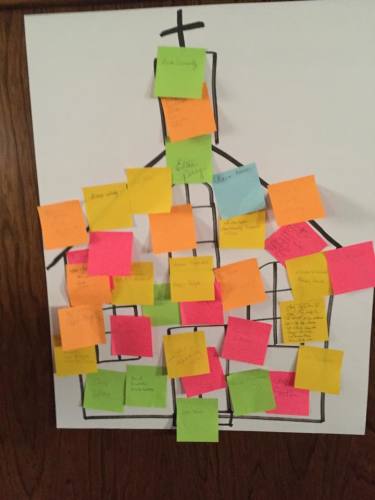 Today is All Saint's Day and in worship this morning at The Federated Church, we remembered the saints. Not just those persons who had died in the last year, but any person in our life that helped us grow in faith.
Today is All Saint's Day and in worship this morning at The Federated Church, we remembered the saints. Not just those persons who had died in the last year, but any person in our life that helped us grow in faith.
At the conclusion of the sermon, each congregation member wrote the name of a saint and brought it forward and placed in on a picture of the church. It was a way to visualize: these are some of the great cloud of witnesses cheering us on!
And this is who was on my post-it: Joe Smith.
[And no it’s not code for some other name. His actual name was Joe Smith—though he hated the ordinary value such a name ascribed him, for he lived no ordinary life.]
Joe and I met over 7 years ago when I was serving my first church out of seminary in the Washington DC suburbs of Maryland.
After being personally recruited by the senior pastor to come to this multi-staff church as his associate pastor, six months later, the senior pastor announced his retirement. I was devastated and worried about my job security and the possibilities for who would be brought in to replaced my beloved boss.
And Joe Smith was the church's replacement.
From the first time I laid eyes on Joe, I knew I wouldn’t like him.
He seemed eager to take my job responsibilities away. Even worse, in our first conversations, he didn’t seem have much respect for young ministers with blonde hair. I remember going home to Kevin crying one bemoaning the fact that I wasn’t going to preach again as long as Joe Smith was my boss. He didn't not want to put me regularly on the preaching schedule.
But, as time passed, the coldness that lodged between Joe and I began to melt.
We realized that our first impressions of one another weren’t true.
We both admired in each other how hard the other one worked and how much we enjoyed being with people. He learned I wasn't a terrible preacher. This man I’d once named my enemy became my friend. (See him pictured directly across from me in the picture below)
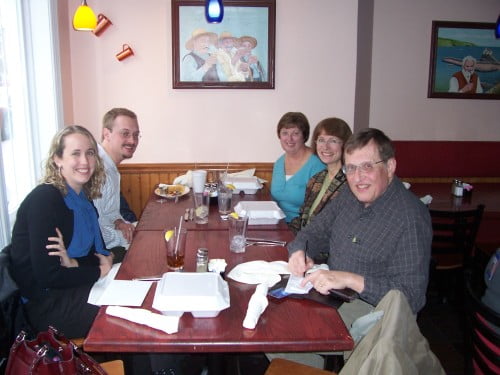
And when the opportunity came up for me to lead my own congregation, Joe was the first person I told.
He was delighted beyond words to come and be one of the preachers at my installation service when my position became finalized.
On my first Sunday at Washington Plaza in January of 2009, I found flowers on the altar that I knew he’d arranged to be present there in support of the day. When I thanked him, he just said, "I wanted you to know that we were thinking of you."
Kind, unassuming gifts were his thing.
And as he cleaned out his library in the months that followed, I was one of the first calls he made. “Do you want to come over and take some of my favorite books?” The Bible that I just read the scripture from this morning was once his.
Joe and I were unlikely friends, but from him, I learned some of the best things I know about following in the path of Jesus.
For at his best, Joe was pure in heart. He modeled for me a life that was all about showing up, believing in God to do what only God could do, and loving people through whatever life handed them. He was a very good pastor.
And when he got sick and died quickly of cancer only a year into my solo pastorate, I got a call from his wife that he had requested that I be one of the speakers at his funeral. I was shocked, asking his wife, “Doesn’t he have some more important colleagues he wants to speak?” “No,” she said, “He wanted you.”
Funerals are for the living, not the dead, as Joe knew—and I believe his act placing me on the speaker's list was Joe’s last gift of encouragement to me. His way of saying, “I believe in you. Keep learning how to live life well too.”
Joe is a saint in my book because in his own quiet way, he used his life for the kingdom. He was the prophet of a future that was not his own, not just because he was a pastor but because he loved Jesus.
He taught me so much about how to follow Jesus too. And today, I am thankful for his memory.
Over the next week, I'm going to be naming more saints I've met along my journey. Watch for another post on Tuesday! And would love to invite other bloggers to post about your #saintstories too. If you blog about a saint send me a message and I'll be sure to tag you to this series.
 Last week, I was having lunch with a friend who I'd hadn't seen in years. As we were catching up on life's ups and downs, she stopped the conversation to make a bold statement: "I'm tired of being a spiritual guide for everyone else."
Last week, I was having lunch with a friend who I'd hadn't seen in years. As we were catching up on life's ups and downs, she stopped the conversation to make a bold statement: "I'm tired of being a spiritual guide for everyone else."
My friend, a veteran minister with a thriving campus ministry under her leadership was speaking to the weariness that had become her own life. She went on, "There are times when I have to remind myself that I'm not just a spiritual tour guide, helping others creating meaningful experiences with God when I don't allow myself to stop and have some of my own." She then told me about the things she's recently added and subtracted from her schedule to make this possible-- growing in her own faith journey again.
I was convicted and encouraged by her honesty of this friend, especially as I'm now in month #4 of my own sabbatical from playing the role of "spiritual tour guide" for a congregation.
Don't get me wrong-- the role, the privilege and the opportunities that come when others entrust you to lead and guide their faith-- is a high and wonderful calling. It's a blessing to those of us who have found or do find ourselves in this role in our communities. And, being a "tour guide" is never a completely serving only others activity. For there is much to learn as you abide in the deep waters of relationship with others.
But, should this be a role we are in for life? Many ministers I know, think so. But, I'm just not sure.
We've all got to take time outs.
I know that what I'm suggesting is nothing profound-- for there are entire centers, book series and support groups of all kinds that encourage personal well-being for those in serving roles such as ministers. Clergy-care is something seminary folks and denominational folks, and foundation folks like to talk about, give money to support and even set up conferences to encourage.
But, the simplicity of my friend's statement: "I want to create spiritual experiences for myself" I think really gets at the heart of what the conversation is missing. And, that is the point of clergy care.
As a pastor, I remember going to conferences where it would be preached to me to :
spend time alone with God every day outside of sermon prep,
put my family above the church as much as I could,
take all of my vacation
AND
never miss a day off (the deadly sin of clergy care!).
I did these things as a pastor (well, a lot of these things). I was proud to take all my vacation and visit a spiritual director once a month and even dream with the leadership about a Sabbatical at some point (funny how I got one sooner than we all would have thought!).
But, even in doing these things, I have to tell you I missed the point.
I never got around to creating spiritual experiences for myself. I never saw myself outside of the role of pastor (a.k.a. spiritual tour guide for others). I rarely made it a priority to position my life to let God speak to me without it having something to do with a Bible Study I needed to lead or a sermon I need to preach. I did the best I could. I know that. And, after all, I had a job to do with deadlines and people who "needed me." I was paid to lead.
Yet, now where I sit now as a disciple of Jesus without tour group, I have to say I'm learning much in this tour group of one.
I'm learning how much I liked my title and role at the church-- though I know now how little such impressed Jesus or made me a "better" or more "faithful" Christian than anyone else.
I'm learning much about prayer-- that the Holy truly wants to abide with me in everyday life, not just the parts I think are holy.
I'm learning much about community-- that "church" can happen very often outside the walls of any building.
I'm learning how to be supportive to my former clergy colleagues-- even when it means playing the part of "Judas" at the last-minute at a Maundy Thursday service (yes, this really happened for this friend).
I know I won't be in this space forever. But, for now, I continue to be grateful for it. I know that even in the uncertainty of what each day ahead holds, I'm still ok as a tour guide in an time-out.
 Writing is a ministry. It's ministry as much as as preaching or pastoral care or any other of the serving tasks.
Writing is a ministry. It's ministry as much as as preaching or pastoral care or any other of the serving tasks.
While in the parish I would often spend afternoons working on articles for publication or blogging. Sometimes I'd feel guilty as I typed away.
Maybe I should have been visiting one more person?
Maybe I should have been a better administrator by filing away paperwork sooner?
Maybe I should have started sermon research earlier in the week? Or maybe not. As my friend, Beth would say, I was "shoulding" all over myself.
Yet, there was always something in me that said writing was important.
So, now and in the immediate future I am claiming the time that I spend writing as my primary ministry. I'm done with the guilt. I'm just going to do it.
And, I'm falling in love as I learn things like:
1. You can't be afraid, as Anne Lamott would say to write a shitty first draft.
I would covet to be the kind of writer who can pour out her soul in perfectly constructed paragraphs and completely interested sentences the first time. But, I just can't. I can't tell you how many boring, throw away sentences I construct on any given day. Writing is always as much about a process than it is about the destination.
2. The more you write, the more it clicks and clicks faster.
It has been amazing to me to start reading like a writer. For example, now, if someone asks me to read a piece of theirs, I can more easily say things like, "You need to cut out the first two paragraphs. You don't make a point til 3/4 down on the first page." Why? Because when you spend your days editing your own work, you begin to see all collections of words of others in a more precise edge. You know a good piece of prose when you see it (and when you don't) and you're ok if others disagree with you.
3. The more you commit to learn the craft of writing, the more you begin to look at the world like a writer.
A big change in me has happened over the past couple of weeks. I walk into a room and think about how I would describe its smell, its texture, or its sounds. Why? Because as I'm trying to narrate a series of past events in book form right now, I realize that in real-time I never really noticed details of settings. I am a big picture girl who does not like to focus on the blades of grass. But, in the future, I want to know. I want to know what it felt like to walk through a crowded bus. Or what it smelled like stepping off an airplane. Or what the countertop of my best friend's mom's kitchen feels like. If I am going to keep writing, then I need to pay closer attention to the blades.
4. The delete button is your best friend.
I don't know about others of you, but I can so easily become attached to sentences. I love them like they are birthed children or the finnest meals ever cooked on silver platters. In love, ignore the run-ons, out-of-place fragments or passive tense verbs. And, because I love them, I never want them to go. But, this can't be! Though painful at first, the crispness of my narrative seems to thank me later (and so does my writing group when they read my drafts!).
5. You can love through words.
Words to me are tools of art. Just as a painter needs brushes or a sculptor needs clay to create what stirs the hearts of any who behold their creation, I need words. I need words to say thank you. I need words to show kindness. I need words to give hope. And in making art-- stories, essays or even sometimes poems, I love. I love myself by creating the space of a sentence to say what is most real. I love those whom I know by paying attention to details which can be later shared back with them. I love those I do not yet know by selecting universal words so my words can be an offering of our common experience.
Other writers what are you learning?
Have you ever been in a situation where a houseguest has left early in the morning before you woke up?
Or you've parted ways with a friend in a mad dash to the airport without final words?
Or you haven't been able to find that favorite teacher or buddy in the midst of the large crowds at a graduation ceremony to say "thanks?"
I think we all have.
And, I hate situations like this.
I like saying goodbye. Closure is a great comfort. Words like, "Thank you" or "I love you" Or, "I look forward to our paths crossing again" are a part of what good endings are all about.
In the church, as many pastoral leaders can tell you, we suffer from a lot of cliff hanger types of relationships with our parishioners. Lots of folks leave without telling us that they are leaving and most certainly not saying goodbye.
Someone has a spiritual or family crisis and goes from present every Sunday serving in multiple ministries to the status of "Where in the world did they go? Anybody heard from them?" in a flash second.
And in response, when contacts of concerns are made by the pastor or other caring church family folks such as: "We miss you. . . . We hope you are alright. . . . We hope you're still alive . . . " and there's no response. It is a great grief is suffered when it feels like the cold shoulder is given. Leaving without saying goodbye can feel like a slap in a face to what the relationship has meant in the months and years prior.
I understand that relationships and the dramas of life are messy, though. I understand that the best possible scenario of closure just is not always possible. But, it doesn't mean that we shouldn't do a better job of holding ourselves accountable to end as well as we began.
So, as you all know, I will be leaving my post as pastor of Washington Plaza Baptist Church on December 24th. It's a little less than a month away. And, in these next several weeks, I want to make good use of the time. I want to continue to engage in the life of the church as much as a possibly can so to make this time of transition a healthy and smooth one for everyone. And, I don't want to leave without saying goodbye.
My pastorate at WPBC has been about more than just the members or regular worship attenders. Many of you online have been a part of our church and many of you have popped in and out of our ministry as your life situations have allowed. I want to include you too. Let me not leave without getting to see you too. Consider coming back to one of our Advent worship services that begin THIS Sunday at 11 am and continue throughout the month.
I have shared with the congregation this week that I am available to meet with folks for lunch or dinner or coffee over the next several weeks. Don't hesitate to contact me to find a time to get together.
I want to say goodbye, celebrate the good work we've done together and anticipate the great future that is ahead for both of us!
I haven't left yet.